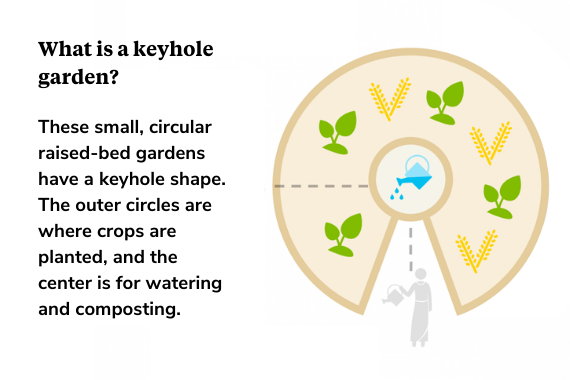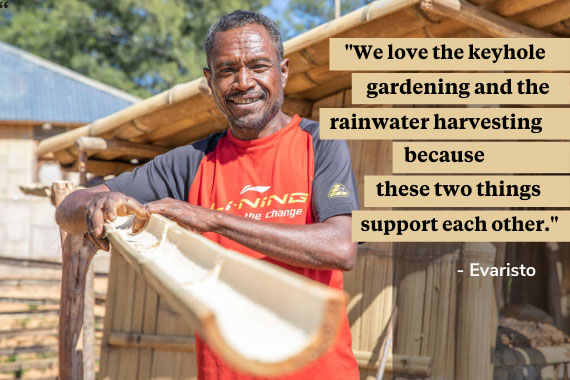
In a year when pandemic has turned the world upside down, we also saw extreme effects from climate change in the U.S. — wildfires along the West Coast, and blackout-causing winter snow and ice storms in the South. In our rapidly changing world, learning to adapt is a skill worth cultivating. And for anyone with some outdoor space and an interest in growing food, building a keyhole garden is one way to cultivate climate resilience in your own backyard. 
These sustainable, regenerative gardens were first used as a way to grow nutritious food in harsh climates. Mercy Corps trained farmers in Timor-Leste to combine keyhole gardens and rainwater harvesting systems, to better endure the country’s increasingly unpredictable dry and rainy seasons. In Timor-Leste, I visited a small village in the beautiful central highlands. I met the community there, heard their stories, and took photographs of this life-changing project. I met farmers like Evaristo, who showed off his new water harvesting system — a series of split-bamboo pipes that led to a catchment pool. He was clearly proud as water coursed through the bamboo and splashed down into the pool below. 
Evaristo, 40, stands next to his bamboo rainwater collection system which he built to nurture a keyhole garden, with training from Mercy Corps.
Before the community began collecting rainwater in this way, Evaristo and his neighbors had to walk 40 minutes to the nearest water source — and sometimes there was nothing but a dry riverbed. Evaristo explains how water availability has also changed which crops they choose to grow: "Before, we depended on [growing] the coffee. We harvested it once or twice a year and had to wait to sell and be able to buy things. Now we have keyhole gardening and we have water to water our vegetables... Even in just two months we can harvest something and sell it." Constructed with low-cost, local materials, this climate-smart farming technology offers families in Timor-Leste year-round access to vegetables both for income and for nutrition. Read more about this project, plus find links to detailed instructions on how to build your own keyhole garden, here. But before you get digging, remember this important tip from Evaristo:
We’re so grateful to members of our global community of humanitarians like you. Together, we can build a stronger world. Sincerely, Ezra Millstein Mercy Corps Senior Global Photographer |
| STAY CONNECTED |
|---|
|
||||||